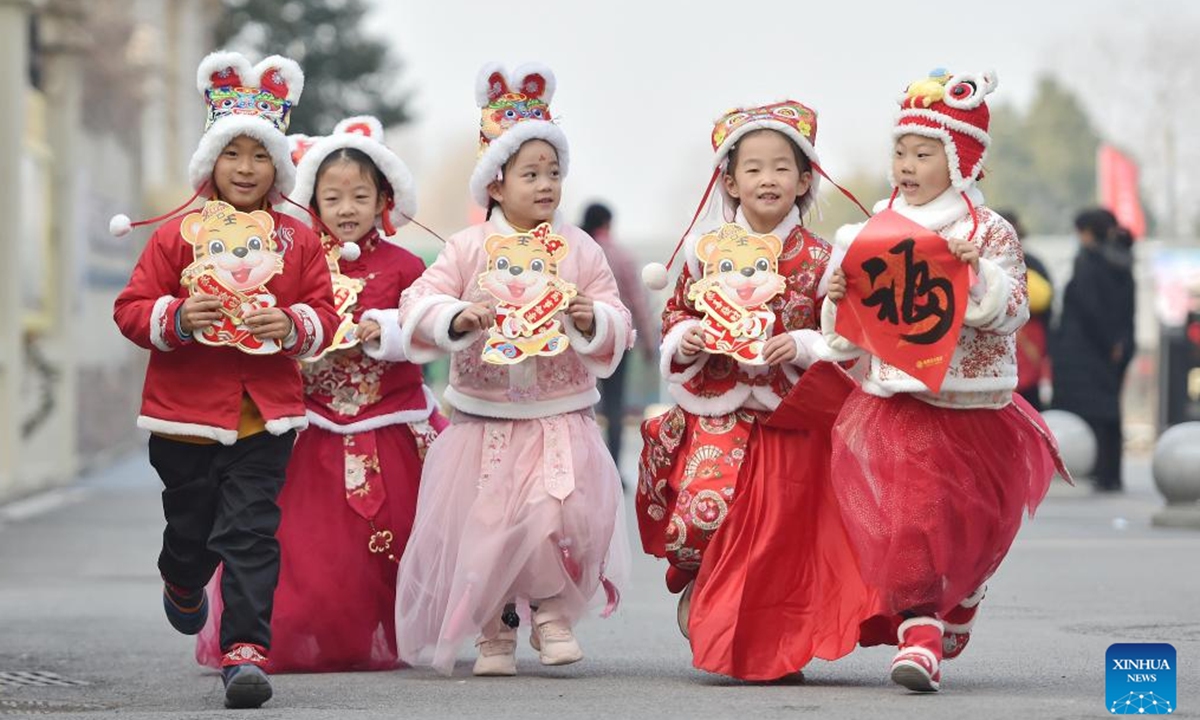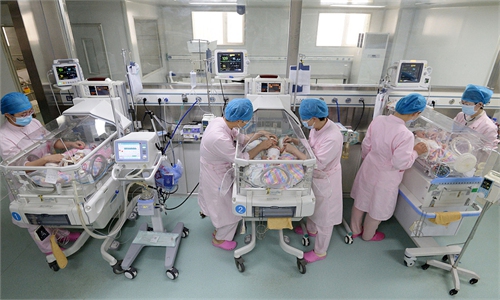Social support system for childbirth should be improved to support China's third-child policy: political advisors

Children wearing tiger-themed hats are seen with decorations on their hands in Hefei, east China's Anhui Province, Jan. 18, 2022. With the arrival of Chinese New Year on Tuesday, the country enters the Year of the Tiger. Photo: Xinhua
Improving China's social support system for childbirth has been a hot topic in the proposals many Chinese political advisors made at the ongoing annual meeting of the Chinese People's Political Consultative Conference (CPPCC) National Committee, as they suggested that more subsidies and services be put in place for childbearing and family-supporting to back the country's third-child policy while the country has entered a zero-growth period.
Xie Wenmin, deputy chairman of the women's federation of Central China's Hubei Province and a member of CPPCC National Committee, told media that Chinese families' desire to have children remains low even though the third-child policy has had a huge influence on Chinese women and their families since it was introduced in July 2021.
China's population has entered a zero-growth period, Chinese demographers said, as the number of newborns in the Chinese mainland dropped to 10.62 million in 2021, close to the number of deaths, according to data released in January by the National Bureau of Statistics.
The lawyer proposed to further increase social support for childbirth and improvement in the system of childbirth subsidies as there are still insufficient policies for women to balance the conflicts between family and work and childbearing and their career development.
Apart from completing the childbearing subsidies covered by the existing social insurance system, which issues monthly subsidies to families with second and third children, a supplementary maternity subsidy system should be set up separately to encourage childbirth, she suggested.
Besides, the system of maternity leave should be improved by increasing incentive maternity leave for having a second child and vigorously promoting paternity leave for men, she noted.
China's population development has entered a new stage, and adjustments to the family planning policy should mainly promote the harmony and happiness of families and help those families with fertility desire realize their wish to have children, said He Dan, another CPPCC National Committee member and director of the China Population and Development Research Center, according to the chinanews.com.
She called for the government to increase investment in the construction of childcare services to ensure childcare institutions will enjoy the same policy support as the kindergartens in China. She is also concerned about reproductive health services for women, proposing to include assisted fertility technologies in the country's basic public services.
Reports show that the high cost of raising children is one of the main factors preventing couples of childbearing age to consider having a child in China. The average cost of raising a child up to the age of 18 was 485,000 yuan ($76,556) in China in 2019, much higher than many countries including the US, France and Germany, according to a report published by the YuWa Population Research think tank.
Some political advisors suggested reducing the burden of women who want to have children by increasing social security in medical care, housing, children education and elderly care.
Zhai Meiqing, vice chairman of the Guangdong Federation of Industry and Commerce, proposed offering housing subsidies to families with three children, and also to promote the construction of supporting service facilities for mothers with infants and young children, such as setting up more breastfeeding stations in public places, reported Yangcheng Evening News.
For women and men who have to quit their job to take care of their children, Yu Xinwei, vice president of the CPPCC committee in Guangzhou, South China's Guangdong Province, said that these "full-time" family worker also deserve to have their "occupational rights and interests" secured, reported the evening news.
The government should fund the purchase of social security for stay-at-home wives and husbands with multiple children so that they can also enjoy the basic five insurances or even enterprise annuity, Yu said.



